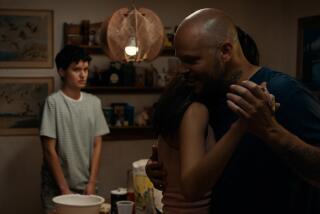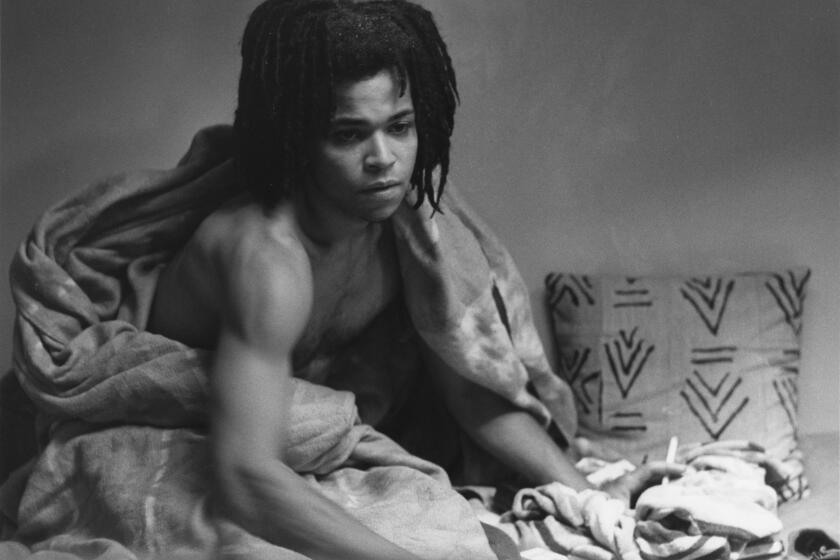Writers of the lost ark
Karma may not be a part of Christian theology, but it’s awfully tempting to apply it to “Evan Almighty’s” underwhelming reception at the box office.
With its uneasy mixture of juvenile pratfall humor and shallow piety, the Most Expensive Comedy Ever Made isn’t connecting with as many of the film faithful as the filmmakers hoped. In its first two weeks, “Evan” has grossed only $61 million, well short of “Bruce Almighty’s” $85.7-million opening weekend, though they share the same director, Tom Shadyac, and writer, Steve Oedekerk. (“Bruce” went on to collect $449 million globally.)
The wreckage left in the wake of the screenplay’s development -- a more entertaining story than the film itself, if as convoluted as the bloodlines in Genesis -- may hint at a little divine retribution.
Back in 1998, Joel Cohen and Alec Sokolow (“Toy Story”) sold a dramedy pitch to Playtone partners Tom Hanks and Gary Goetzman called “Steadman’s Leap,” about a modern small-town guy who starts seeing signs, builds an ark and struggles to deal with the fallout with his friends and neighbors. Playtone brought in Shadyac, a devout Christian who had already acquired a reputation as “God’s man in Hollywood,” to direct. The writers developed it with Shadyac until Hanks backed away and the project went into hibernation.
Four years later, in 2003, the Shadyac-directed “Bruce” killed at the box office, and discussions about a sequel quickly began. A few weeks after Mel Gibson’s “The Passion of the Christ” drew $604-million worth of the faithful in early 2004, unproduced writers Bobby Florsheim and Josh Stolberg sent around a spec shrewdly titled “The Passion of the Ark” -- again, about a modern-day ark building -- which sparked a huge bidding war until Sony threw an enormous $1.5 million-against-$2.5 million payday into the pot.
As it turned out, Shadyac had contacted Florsheim and Stolberg during the melee and told them about the other ark project that he was working on, which is one of the reasons the writers sold it to Sony instead. But Universal, which houses Shadyac’s production company, quickly convinced Sony to share the project with them. Shadyac brought in “Bruce” co-writer Oedekerk to turn it into a sequel, and Florsheim and Stolberg were banished from the project. Ultimately, original star Jim Carrey begged off the sequel, and the filmmakers revamped it for Steve Carell.
But when it came time to determine credits, Universal submitted only Oedekerk’s name for a “written by” credit. In the meantime, Cohen and Sokolow had read the “Evan” screenplay and were surprised to see substantial structural, thematic and character similarities not to the “Ark” script that Universal had spent so much money on, but to their script from the late ‘90s (which could mean that Shadyac acquired “Ark” merely to bury a competing project, a not uncommon ploy in the industry).
So Cohen and Sokolow submitted “Leap” to a special reader at the Guild, who agreed that it deserved to be considered as part of the arbitration despite Universal and Shadyac’s claim that the two projects were not connected.
When the Guild hearing decided that all five writers should share story credit with Oedekerk maintaining sole screenplay credit, Florsheim and Stolberg appealed the ruling (presumably because their deal would have entitled them to an enormous bonus if they came out with a screenplay credit). The Guild agreed to hold a second hearing, with an unexpected result: Florsheim and Stolberg lost their story credit.
Some feel that the version of the screenplay that was green-lighted had much of its funny bulldozed by Shadyac’s effort to frontload the religious message. What was amusing about “Bruce” was the way it illustrated what a human being would actually do with godly power -- namely, abuse it. But the remote-orgasm and punishing-your-enemies wish fulfillment of “Bruce” became an eye-glazing Sunday school sermon about submitting to God’s will in “Evan” -- a sermon many moviegoers were happy to miss.
Here endeth the lessons.
Promostiltskin
The in-the-room pitch is almost universally loathed among writers. So in a bit of entrepreneurial anxiety-avoidance, a former network promo writer-producer named Steve Brodeur has been experimenting with a new form.
Brodeur has produced a three-minute audio pitch in his home recording studio that he hopes to e-mail to producers and agents, sell and turn into a feature called “Promostiltskin.”
In his brief audio trailer, Brodeur makes juicy use of session outtakes from Ernie Anderson’s ubiquitous voice-over work for ABC in the ‘70s and ‘80s to embody a fictional character named Artie Abbott, who has a particularly sour attitude toward the writers feeding him lines. The result, Brodeur hopes, is a “fractured fairy tale black comedy romance set on the Hollywood fringe at the dawn of the ‘80s.” (You can listen to it at www.promostiltskin.com.)
“You often hear from screenwriters that they fear and loathe the pitch process for a number of reasons, the first and foremost being that they’re usually not natural performers,” says Brodeur, who worked with Anderson, father of writer-director Paul Thomas Anderson (“Punch Drunk Love”), in the ‘80s. “I would include myself in this category.
“And pitching is even more daunting when your story idea is not particularly ‘high concept,’ which ‘Promostiltskin’ isn’t. It’s material that’s quirky and character-driven. All of which is much more effectively communicated, in my opinion, by this Internet audio pitch.”
Last month, Brodeur targeted several Endeavor agents and e-mailed them a query letter with his audio brainstorm. Brodeur points out that among the audio pitch’s appeals are its brevity and convenience, since it can be replayed for anyone pretty much anywhere, at any time -- including never (unsurprisingly, he has not received any replies).
But even if Brodeur’s particular audio pitch attempt is doomed (a new title couldn’t hurt), it’s worth giving it a listen merely to hear a throwaway line Ernie delivers about two-thirds of the way, dripping with contempt: “Where do they find these ... writers?”
--
Scriptland is a weekly feature on the work and professional lives of screenwriters. Please e-mail any tips or comments to fernandez_jay@hotmail.com.
More to Read
Only good movies
Get the Indie Focus newsletter, Mark Olsen's weekly guide to the world of cinema.
You may occasionally receive promotional content from the Los Angeles Times.










